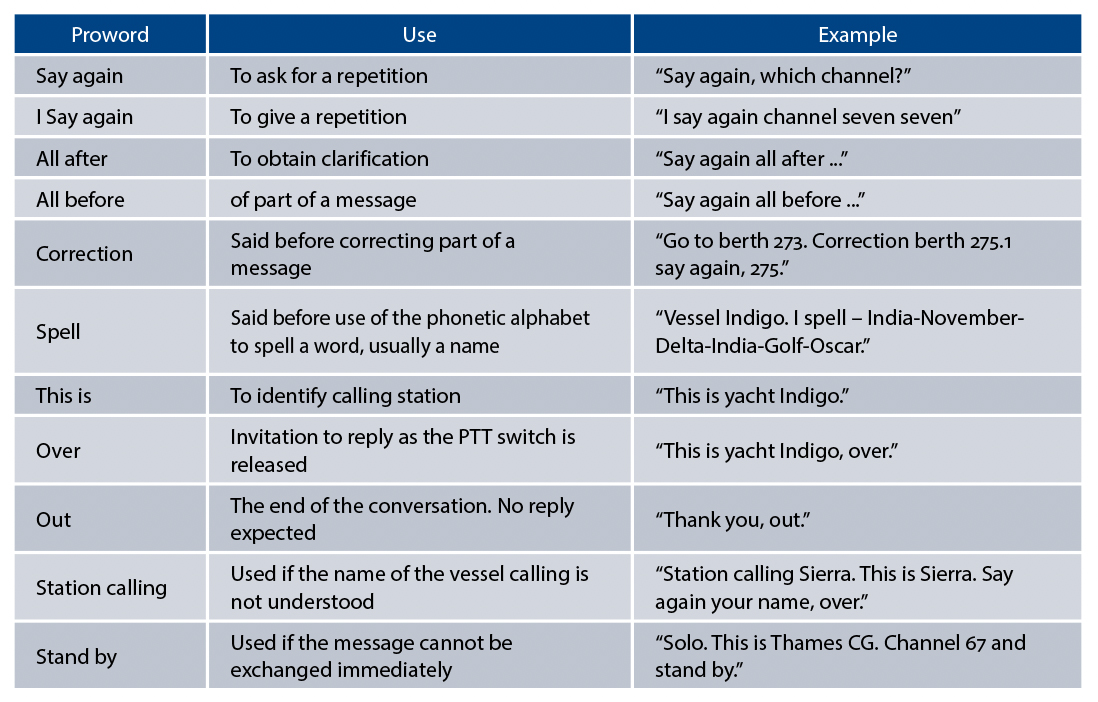VHF Radio: Prowords
Book Extract
Prowords are procedural words that have a commonly understood meaning and are intended to make communications brief and easily understood. Avoid jargon that is heard in old TV programmes and just sounds silly. Avoid questions like “Are you receiving me?” because if the call is not heard then no one will reply. You will know the answer! “How do you read?” is a question from the time that old military radios had dials to show the level of reception.
These are a few of the most useful prowords used in normal calls.

From this table, and using common sense, you can see how short phrases can be put together in recognised patterns to make the meaning clear and to keep all messages as brief as possible. Several short statements are more easily understood than a long rambling sentence. Avoid unnecessary repetitions and speak slowly. Remember that someone may be trying to write down what you are saying.
Prowords used in Distress situations
Mayday
Under international law the word Mayday may only be used if “there is grave and imminent danger to vessel, vehicle, aircraft or person which requires immediate assistance”. It is vital to remember this. The situation must be life threatening. Every captain and every skipper is obliged to provide assistance in a Mayday situation if they can. They should not put their vessel or crew in danger but they must help if possible despite inconvenience to crew, passengers or shipping company. Sending a Mayday or being involved in assisting in a Mayday situation is a serious responsibility and can only be undertaken on the skipper’s authority. The origin of Mayday is the French “m’aidez”, meaning “help me”.
Seelonce Mayday
While a Mayday is in progress radio silence is automatically imposed, on the distress channel, on all vessels not involved. The Coastguard dealing with the incident or the casualty vessel may say “Seelonce Mayday” if it is necessary to remind shipping of this.
Seelonce Distress
Any station nearby who is convinced that it is necessary to impose radio silence can use the expression “seelonce distress”.
Prudonce
Complete radio silence may not be required once the rescue services are involved and are dealing with the incident. “Prudonce” is used to relax but not lift the radio silence. The VHF can be used prudently. Any channel being used for communications concerned with the distress situation should be used with extreme brevity.
Seelonce Feenee.
Radio silence is lifted.
Mayday Relay
A message sent by a vessel, not itself in distress, passing on the distress information. This would be done if the distress vessel could not transmit the Mayday or has indicated its distress with flares or some other internationally recognised distress signal. A relay might be used if a Mayday was heard which did not seem to be acknowledged by the Coastguard or any other vessel which might be able to assist. This is unlikely in an Al area under normal circumstances, but the casualty could have a problem which drastically reduces the range of their transmissions or be in a location which is a radio ‘blind spot’. It is important that the separate identity of the casualty vessel and the vessel sending the relay are made clear.
Received Mayday
Used, usually by the Coastguard, to acknowledge receipt of a distress message. This implies that assistance of some kind will be provided. This could be direct assistance by a vessel nearby or indirectlyprovided as in the case of the Coastguard sending a lifeboat or helicopter.
Pan Pan
Pan Pan is used to preceed an urgent message when the skipper may need some assistance, but where the situation is not life threatening. This might be an engine failure, where the boat is not in immediate danger, but does require an urgent tow. Pan Pan can also be used if the urgent message concerns a request for medical advice or assistance. The origin of pan pan is from the French “en panne” meaning broken down.
Securite
A message containing safety information can be preceded by the word securite. This is most commonly used by the Coastguard before broadcasting a new gale or navigation warning.
© Not to be reproduced without written permission from Fernhurst Books Limited.
VHF Afloat is written by Sara Hopkinson. Sara is an experienced sailor, and a Yachtmaster Instructor and Examiner. She runs an RYA Training Centre at Pin Mill in Suffolk which specialises in navigation, radio, radar and first aid courses. She was a Coastguard Rescue Officer for many years and was the Station Officer of HM Coastguard, Holbrook. Sara has written books for the RYA and Fernhurst Books’ Navigation: A Newcomer’s Guide, VHF Afloat and VHF Companion.